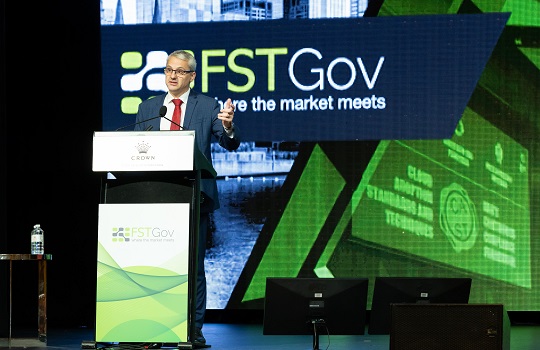
Regulatory technology (regtech) will play an increasingly important role in future governments, including councils, with its potential to drastically improve efficiencies and the regulatory performance of the public sector, according to Minister for Government Services and Minister for Regulatory Reform Danny Pearson.
“[Think] about the government for a moment and what it does – we regulate industries, we issue licenses, issue approvals and permits. But we also deliver services. There is an opportunity for us to try to improve our efficiencies and our performance in relation to regulation,” Pearson said as part of his opening address at the FST Government Victoria 2022 event.
“We can digitise those functions and we can make sure that those are seamless offerings to all citizens,” Pearson said.
Regtech remains a high priority on the Victoria Government’s tech agenda, he said, noting particularly its value for local governments. Pearson noted opportunities to work closely with councils and streamline widescale regtech deployments, with successful regtech solutions for one council able to be utilised across multiple – if not all – municipalities.
“There is a partnership on the table where we can work with local government [in that way]. If we can develop a solution in one municipality, there is an opportunity for us to replicate that and roll it out across the other 78.”
The 2020-21 Victorian Budget allocated $75 million over four years for regulatory reform to support the state’s economic recovery, including $40 million for a Regulation Reform Incentive Fund to support Victorian regulators and local governments in reducing red tape, speeding up approvals, and simplifying processes. It was estimated up to $200 million could be realised in annual ongoing benefits from these initiatives.
Pearson also noted the primacy of gender equality in the Victorian Government’s tech industry reform agenda, with a focus on increasing women’s participation in emerging data and digital solutions – a segment that represented the “highly skilled, well renumerated, stable and secure jobs of the 21st century”.
“If we think about our public service, the public sector must represent the community it serves. We’ve got to try to make sure that women have the opportunity to participate.
“We cannot have a situation with these decisions being made by people who look like me, think like me and act like me exclusively,” Pearson noted.
“We need to make sure that when it comes to digital and data, more women try to skill up to participate. We’ve got to try and find a way to make sure that there are more women at the table in those senior leadership roles and those senior decision-makers positions.”
As a part of the efforts to strengthen women’s representation, the Victorian Government has partnered with Code Like a Girl, a social enterprise supporting women to advance and upskill in the world of coding. The program now offers four-month incentives courses aimed at facilitating the advancement of women “with zero coding skills to junior web developers”.
Commenting on other Vic Gov initiatives, the Minister singled out the launch of Engage Victoria, a website dedicated to Victorian Government consultations and ideas exchange, as well as the importance of establishing a ‘single digital presence‘, which represented a growing trend for the consistent flow of information and “a trusted source of truth” that citizens demanded.
“All the things we are trying to do, all my hopes and aspirations of what digital looks like, we’ve got to engage with the community and we’ve got to know if we are getting it wrong.
“We’ve got to have that feedback loop. And we have got to have trust with the citizens, because if citizens trust in what we are, who we are and what we are doing, then they will engage with us more.”





